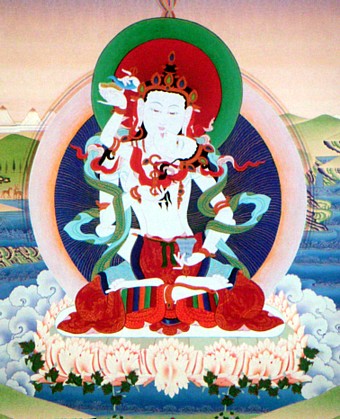Hundred syllable mantra

The hundred syllable mantra (Tib. ཡིག་བརྒྱ་, yik gya; Wyl. yig brgya) of Vajrasattva is as follows:
oṃ vajrasattvasamayam anupālaya vajrasattvatvenopatiṣṭha dṛḍho me bhava
sutoṣyo me bhava supoṣyo me bhava anurakto me bhava
sarvasiddhiṃ me prayaccha sarvakarmasu ca me cittaṃ śreyaḥ kuru hūṃ
ha ha ha ha hoḥ bhagavan sarvatathāgatavajra mā me muñca vajrī bhava mahāsamayasattva āḥ
Translation[1]
OM
The most excellent exclamation of praise
VAJRASATTVA SAMAYA
Vajrasattva’s Samaya:
MANUPALAYA VAJRASATTVA
O Vajrasattva, protect the Samaya
TENOPA TISHTHA DRIDHO ME BHAWA
May you remain firm in me
SUTOKHAYO ME BHAWA
Grant me complete satisfaction
SUPOKHAYO ME BHAWA
Grow within me (increase the positive within me)
ANURAKTO ME BHAWA
Be loving towards me
SARWA SIDDHI ME PRAYACCHA
Grant me all the siddhis
SARWA KARMA SU TSA ME
Show me all the karmas (activities)
TSITTAM SHREYANG KURU
Make my mind good, virtuous and auspicious!
HUNG :
The heart essence, seed syllable of Vajrasattva
HA HA HA HA :
Symbolises the four immeasurables, the four empowerments, the four joys, and the four kayas
HO :
The exclamation of joy at this accomplishment
BHAGAWAN SARWA TATHAGATA
O blessed one, who embodies all the Vajra Tathagatas
VAJRA MA ME MUNCA
Do not abandon me
VAJRI BHAWA
Grant me the realization of the Vajra Nature
MAHA SAMAYASATTVA
O great Samayasattva
AH
Make me one with you
100 Syllables
The 100 syllables seem to be counted as follows: [Om] vaj ra sat tva sam a yam an u pal a ya vaj ra sat tva ten op a ti shta dri to me bha va su tosh yo me bha va su posh yo me bha va an u rak to me bha va sar va sid dhi me pra yac ccha sar va kar ma such a me chit tam shri yang ku ru hung ha ha ha ha ho bha ga van sar va ta tha ga ta vaj ra ma me muñ cha vaj ri bha va ma ha sam a ya sat tva a hung [phat]
Notes
- ↑ The English translation seems to be based on Jamyang Khyentse Wangpo's translation into Tibetan. Rigpa translations.